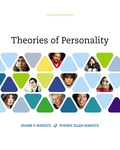
EBK THEORIES OF PERSONALITY
11th Edition
ISBN: 9781305887503
Author: Schultz
Publisher: CENGAGE CO
expand_more
expand_more
format_list_bulleted
Question
Chapter 14, Problem 21RQ
Summary Introduction
To explain:
The influences of financial status, health, race, and culture on subjective well-being
Introduction:
Subjective well-being refers to the happy personality aspect which stems for both rational and emotional aspects of an individual. There has been plenty of research on the factors influencing subjective well-being.
Expert Solution & Answer
Want to see the full answer?
Check out a sample textbook solution
Students have asked these similar questions
What are some lessons learned and gained from working with school behavior students?
How to indicate what worked, what didn’t, and list organizational & societal challenges & opportunities. Include critical analysis of what changes or adjustments you would suggest or try in the field or program, to improve efficacy.
As we embark on this 10-week course on the psychology of creativity, I encourage each of you to evaluatethe various theories and ideas presented in the course from multiple perspectives. Specifically, reflect onhow the given theory/concept does or doesn’t capture your own experience, when engaged in creativeendeavours. Then, because no one theory is likely to have universal applicability, consider whether itseems to capture aspects of the creative process you’ve observed in others. Also think about whether itcaptures elements of your own evaluation of creative work (including the work of those around you aswell as the work of well-known artists).Although no one theory is likely to explain or describe everything about creativity, the so-called “Four Cs”discussed in this week’s readings give us one starting point, to classify subtypes of creativity. Kaufmanand Beghetto (2013) describe the following types of creativity:• Big-C: Genius-level works, generally regarded as masterpieces. Their…
This unit introduces students to identity formation theories and how our identities create roles that interact in society. This activity aims to use these concepts to connect students' understandings of how they curate their own personal and social identities to fit in with social roles and expectations.
Instructions
Reflect on the article by Ravishankar (2020). What’s wrong with asking, ‘Where are you from?’ Have students reflect on their identity and whether they’ve been asked this question before. How did it feel? What can it make someone feel about their identity? Drawing on the discussion from this unit, analyze how social and individual identity can help us better understand who we are in relation to the world/culture/society around us.
Chapter 14 Solutions
EBK THEORIES OF PERSONALITY
Knowledge Booster
Similar questions
- Identify applicable scenarios and examples observed ‘in action’ during your class behavior. Provide an analysis of psychological theory, themes, and concepts evident in the work observed during class. What theoretical framework is used to understand/explain what occurred in your experiences?arrow_forwardwhat makes the candomble tradition stand out?arrow_forwardby observing behavior students in class , what your thoughts about the effectiveness and purpose of the work being done there?arrow_forward
- When would using checklists and rating scales be most appropriate in early childhood? Use scholarly sources.arrow_forwardI need help with two articles are there any similarities and differences between the two https://www.phnompenhpost.com/business/indian-ambassador-pledges-increased-trade-tourismpromotion, https://time.com/5486460/pol-pot-cambodia-1979/arrow_forwardEvaluate the application of behaviourism and cognitive psychological perspectives to contemporary issues in psychology.arrow_forward
- Analyse the similarities and the differences between behaviourism and cogniperspectives in psychology.arrow_forwardEvaluate the work of key theorists Neisser, 1967 relating to congnitive psychological perspectivearrow_forwardEvaluate the work of key theorists John B. Watson and B.F. Skinner relating to behaviourismarrow_forward
arrow_back_ios
SEE MORE QUESTIONS
arrow_forward_ios
Recommended textbooks for you
 Ciccarelli: Psychology_5 (5th Edition)PsychologyISBN:9780134477961Author:Saundra K. Ciccarelli, J. Noland WhitePublisher:PEARSON
Ciccarelli: Psychology_5 (5th Edition)PsychologyISBN:9780134477961Author:Saundra K. Ciccarelli, J. Noland WhitePublisher:PEARSON Cognitive PsychologyPsychologyISBN:9781337408271Author:Goldstein, E. Bruce.Publisher:Cengage Learning,
Cognitive PsychologyPsychologyISBN:9781337408271Author:Goldstein, E. Bruce.Publisher:Cengage Learning, Introduction to Psychology: Gateways to Mind and ...PsychologyISBN:9781337565691Author:Dennis Coon, John O. Mitterer, Tanya S. MartiniPublisher:Cengage Learning
Introduction to Psychology: Gateways to Mind and ...PsychologyISBN:9781337565691Author:Dennis Coon, John O. Mitterer, Tanya S. MartiniPublisher:Cengage Learning Psychology in Your Life (Second Edition)PsychologyISBN:9780393265156Author:Sarah Grison, Michael GazzanigaPublisher:W. W. Norton & Company
Psychology in Your Life (Second Edition)PsychologyISBN:9780393265156Author:Sarah Grison, Michael GazzanigaPublisher:W. W. Norton & Company Cognitive Psychology: Connecting Mind, Research a...PsychologyISBN:9781285763880Author:E. Bruce GoldsteinPublisher:Cengage Learning
Cognitive Psychology: Connecting Mind, Research a...PsychologyISBN:9781285763880Author:E. Bruce GoldsteinPublisher:Cengage Learning Theories of Personality (MindTap Course List)PsychologyISBN:9781305652958Author:Duane P. Schultz, Sydney Ellen SchultzPublisher:Cengage Learning
Theories of Personality (MindTap Course List)PsychologyISBN:9781305652958Author:Duane P. Schultz, Sydney Ellen SchultzPublisher:Cengage Learning

Ciccarelli: Psychology_5 (5th Edition)
Psychology
ISBN:9780134477961
Author:Saundra K. Ciccarelli, J. Noland White
Publisher:PEARSON

Cognitive Psychology
Psychology
ISBN:9781337408271
Author:Goldstein, E. Bruce.
Publisher:Cengage Learning,

Introduction to Psychology: Gateways to Mind and ...
Psychology
ISBN:9781337565691
Author:Dennis Coon, John O. Mitterer, Tanya S. Martini
Publisher:Cengage Learning

Psychology in Your Life (Second Edition)
Psychology
ISBN:9780393265156
Author:Sarah Grison, Michael Gazzaniga
Publisher:W. W. Norton & Company

Cognitive Psychology: Connecting Mind, Research a...
Psychology
ISBN:9781285763880
Author:E. Bruce Goldstein
Publisher:Cengage Learning

Theories of Personality (MindTap Course List)
Psychology
ISBN:9781305652958
Author:Duane P. Schultz, Sydney Ellen Schultz
Publisher:Cengage Learning